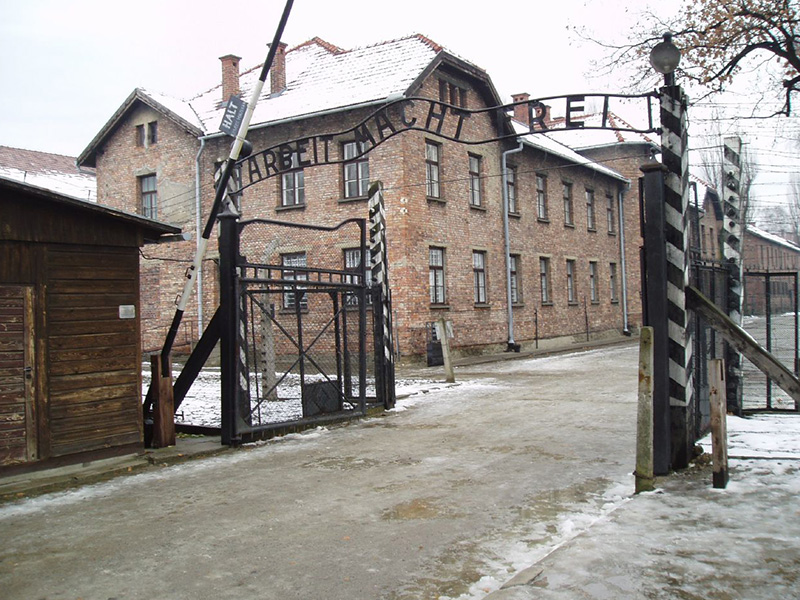Alex Johnstone, the Hamilton-area NDP candidate who was embroiled in controversy following the resurfacing of a Facebook comment in which she made a penis joke about an electrical fence at Auschwitz, joined the latest From Compassion to Action tour organized by the Friends of Simon Wiesenthal Centre for Holocaust Studies during which she visited the notorious death camp.
In September, Johnstone, who ran in the recent federal election, made international news after a satirical online publication dug up a seven-year-old Facebook comment about Auschwitz’s “infamous Pollish (sic), phallic, hydro posts.”
Johnstone promptly apologized for the gaffe and told reporters, “I didn’t know what Auschwitz was, or I didn’t up until today.”
When FSWC president and CEO Avi Benlolo heard the story, he invited Johnstone to join a 28-person delegation of law enforcement professionals, government officials, and Catholic school educators that travelled to Austria, Poland and Israel from Oct. 11 to 18.
Johnstone, who only joined the trip for the programming in Austria and Poland – which included a tour of Auschwitz and other historical sites related to the Shoah, and marked the first time she had ever travelled overseas – thanked Benlolo for the invitation, adding that the trip “had a deeply profound impact” on her.
“Some of the more profound moments was having the honour of meeting with Auschwitz survivor Max Eisen who shared his personal and horrific memories as we walked through the grounds,” she said.
“Seeing the two tons of human hair from Auschwitz victims just gutted me. Walking along the electric fence, and seeing the ovens, you imagine all the people, all the moms, the dads, their children, the horrors that were enacted against them.”

Benlolo, who has been leading these tours since 2010, said influential Canadians are invited on the tours to teach them about the devastating effect racism can have on humanity.
“Who are the front line people in our society? Who are the people who will respond to hate and crime and anti-Semitic attacks and need to have the best understanding? It is in our interest to have them educated and to understand the issues that we’re dealing with as a community,” Benlolo said.
“Obviously for the educators, it’s the same thing. They’re educating the next generation of students and we want them to understand the history and the legacy of the Holocaust and what Israel is dealing with on a daily basis. All of these people have a huge network of people around them and can influence them and that is the objective.”
Moose Jaw Police Chief Rick Bourassa, who joined the tour, said although he had been taught about the Holocaust as a student, visiting the Auschwitz concentration camp gave him a deeper understanding.
“I’d seen the videos and the pictures and it is one thing to see those things at a distance without it being connected with someone and to understand intellectually what happened, but to actually be standing there, with Max, with a survivor, brought it to a whole new level of awareness,” Bourassa said.
“It was almost a bit of a sick feeling I had in my stomach. For a moment I sensed what it must have felt like for those people who were going through those gates, not knowing what awaited them.”
Benlolo said the tour, which ended in Israel, helped the delegates understand the Jewish community’s reaction to anti-Semitism and anti-Israel rhetoric.

“We wanted them to understand why Israel reacts the way it does for security reasons, why it reacts the way it does to Iran, and why the Jewish community here gets upset about various contemporary issues, like campus anti-Semitism,” Benlolo said.
Bourassa said the lessons he learned on the tour can be applied to Canadian society today.
“What it really brought home to me was the importance of inclusive communities and making sure that there aren’t divisions, whether they be social, economical, psychological, physical, whatever those barriers are… It’s so important we keep them removed.”
Johnstone agreed, and said, “After seeing what hate can amount to, I’m very concerned about the rise in racism and anti-Semitism and hate in our world today. Hate can be found everywhere, from our speech to our actions. I walked away thinking that we have to work harder to dissipate the hate that exists in our society.”
